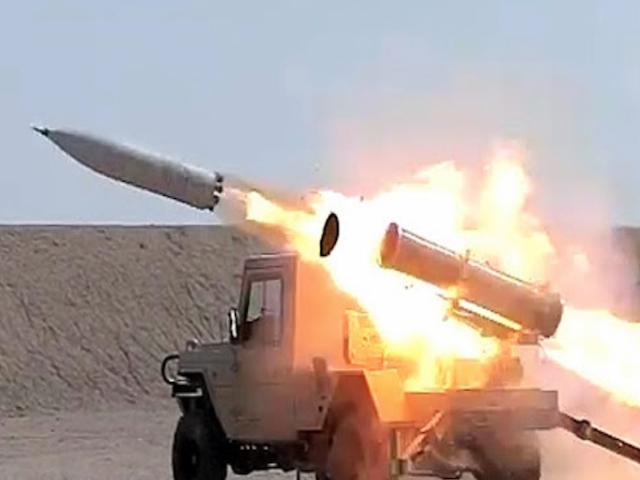On Saturday, the terrorist organization Hezbollah claimed responsibility for firing advanced Iranian-manufactured Falaq-2 rockets at an Israeli military base in Beit Hillel, northern Israel. This incident marks the first reported use of such rockets by Hezbollah forces in Lebanon against Israel. The Falaq-2 rockets, which have a range of 11 kilometers (approximately 7 miles) and carry a 60 kg (about 130-lb) warhead, represent a significant escalation in the fire exchange between Israeli forces and the Iranian-backed militia. The Falaq-2 is an upgrade from the Falaq-1 rocket, which Hezbollah began using six months ago and has a slightly smaller 50 kg (110-lb) warhead.
Hezbollah's introduction of the Falaq-2 rocket into the conflict is viewed as a deliberate escalation, with the terror group claiming it was "forced" to escalate its rocket response due to alleged Israeli military violations of tacit confrontation rules. The Lebanese-based group began launching these attacks against northern Israeli communities shortly after Hamas terrorists invaded southern Israel and committed a massacre, killing over 1,200 men, women, and children.
Hezbollah announced today that they had launched a Barrage of “Falaq-2” Unguided Rockets against Northern Israel for the First Time, with the Rockets claimed to have Targeted the Beit Hilal Military Base near the City of Kiryat Shmona. pic.twitter.com/bbGGHLfES3
— OSINTdefender (@sentdefender) June 8, 2024
Just last week, an IDF reservist soldier, Staff Sgt. (res.) Refael Kauders, was killed in a Hezbollah drone attack on the northern Israeli town of Hurfeish, which also injured ten other IDF soldiers. This incident underscores the increasing threat posed by Hezbollah’s intensified attacks.
In response to these escalating threats, Israeli President Isaac Herzog has called on the international community to condemn the cross-border terrorism emanating from Lebanon. “I turn from here to the international community and its leaders and emphasize – it is impossible to remain indifferent to this terrorism, from Lebanon and in general,” Herzog stated. “Israel has been attacked daily, for many months, by Iran’s arms in Lebanon, in flagrant violation of all international agreements and resolutions. The world needs to wake up and realize that Israel has no choice but to protect its citizens and don’t be surprised when it does so ever more strongly and firmly, and don’t complain when the situation is out of control. This is not the time to stand by and let the arena escalate. This evil terrorist aggression must be curbed and stopped.”
Hezbollah’s aggression has also increased in range. A recent drone attack targeted an open area in the Jezreel Valley, close to Nazareth, marking the deepest penetration of Israeli territory since the ongoing aggression began on October 8. While the drone attack was unsuccessful, it signifies a new level of threat from Hezbollah.
🚀🇮🇷 Vedio of Iranian Missile Falaq 2
— Resistance Monitor🏴 (@Resistance151) June 9, 2024
📍 Range :10 km
📍 Caliber: 333
📍 Warhead weight: 117 kg pic.twitter.com/Ox0wfOP5n1
Hezbollah Deputy Secretary-General Naim Qassem has indicated that the group is not interested in expanding the conflict unless provoked by Israeli responses. However, the continuous attacks have forced tens of thousands of Israeli civilians to evacuate their homes, and Israeli military and political leaders are growing increasingly aware that the current threat from Hezbollah is untenable.
IDF Chief of Staff Lt.-Gen. Herzi Halevi recently warned that Israel is nearing a critical decision point. “We are approaching the point where a decision will have to be made, and the IDF is prepared and very ready for this decision,” Halevi stated.
Hezbollah Unleashes Iran made Falaq-2 Missiles On Israeli Command Centre; 117Kg Warhead for the first time, targeting the IDF's Sahel Battalion headquarters. At time of tweet 10 missiles have been unleashed. Israel northern border is on Fire. pic.twitter.com/wNDaCAsfvA
— IMRAZ (@imraz_aniff) June 9, 2024
Despite efforts by the U.S. and France to find a diplomatic solution to the Hezbollah crisis, Israel has signaled that while it prefers diplomacy, it is prepared to use military force to address the threat from its northern border. The Biden administration has expressed concern that a "limited war" with Hezbollah in Lebanon could potentially trigger a broader Iranian response, involving pro-Iranian terrorists from Syria, Iraq, and Yemen joining Hezbollah forces against Israel.
The situation remains tense, with the potential for further escalation if diplomatic efforts fail and military action becomes inevitable.


